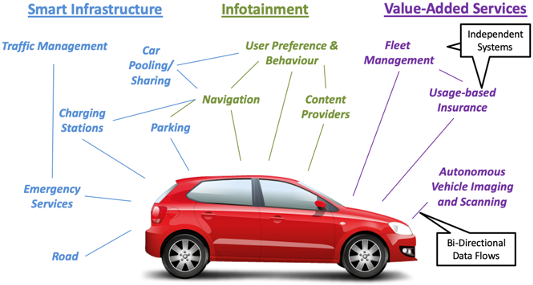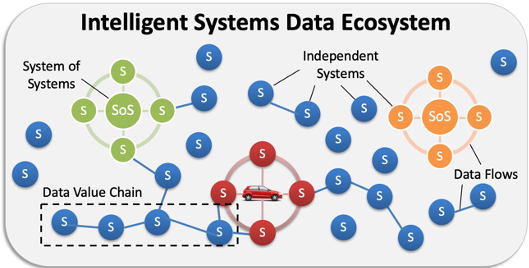Data Ecosystems
The digital transformation is creating an ecosystem with data on every aspect of our world spread across a range of information systems. Data ecosystems present new challenges to the design of intelligent systems that require a reconsideration of how we deal with the data management needs of large-scale data-rich smart environments. Intelligent systems need to support openness, flexibility, and dynamicity (Ahmed et al., 2016) with the ability to deal with incremental change at minimum cost. To understand the emerging data management challenges, we explore the design of intelligent systems within smart environments and the need to support knowledge flows within data ecosystems.
Intelligent Systems Data Ecosystem

Within a data ecosystem, participants (individual or organisation) can create new value that no single participant could achieve by itself (Cavanillas, Curry and Wahlster, 2016). A data ecosystem can form in different ways, around an organisation, a community of interest (music), a geographical location (city), or within or across industrial sectors (manufacturing, pharmaceutical). In the context of a smart environment, the data ecosystem metaphor is useful to understand the challenges faced with the cross-fertilisation and exchange of knowledge from different intelligent systems within the environment.
A key challenge within the design of intelligent systems is the need to extract valid and accurate insights from the data generated by a smart environment to make useful and meaningful decisions for business and society. The above image details the data ecosystem for a connected autonomous vehicle where a community of interacting information systems share and combine their data to provide a holistic functional view of the car, passengers, city mobility, and service and infrastructure providers. Data may be shared about the current operating conditions of the vehicle, traffic flows, or context of the passengers (e.g. a family on holiday or a business executive moving between meetings) to support real-time decision-making, personalised digital services, or data on past observations to improve learning processes.

An intelligent systems data ecosystem (see above Figure) describes a community of interacting information systems that can share and combine their data to provide a functional view of the environment (Curry and Sheth, 2018). The ecosystem supports the flow of data among systems, enabling the creation of data value chains to understand, optimise, and reinvent processes that deliver insight to optimise the overall environment. In a data value chain, information flow is described as a series of steps needed to generate value and useful insights from data (Curry, 2016). Systems within the ecosystem can also come together to form a System of Systems.
References
Ahmed, E. et al. (2016) ‘Internet-of-things-based smart environments: state of the art, taxonomy, and open research challenges’, IEEE Wireless Communications, 23(5), pp. 10–16. doi: 10.1109/MWC.2016.7721736.
Cavanillas, J. M., Curry, E. and Wahlster, W. (2016) New Horizons for a Data-Driven Economy: A Roadmap for Usage and Exploitation of Big Data in Europe. Edited by J. M. Cavanillas, E. Curry, and W. Wahlster. Cham: Springer International Publishing. doi: 10.1007/978-3-319-21569-3.
Curry, E. (2016) ‘The Big Data Value Chain: Definitions, Concepts, and Theoretical Approaches’, in
Cavanillas, J. M., Curry, E., and Wahlster, W. (eds) New Horizons for a Data-Driven Economy: A Roadmap for Usage and Exploitation of Big Data in Europe. Springer International Publishing. doi: 10.1007/978-3-319-21569-3_3.
Curry, E. and Sheth, A. (2018) ‘Next-Generation Smart Environments: From System of Systems to Data Ecosystems’, IEEE Intelligent Systems, 33(3), pp. 69–76. doi: 10.1109/MIS.2018.033001418.